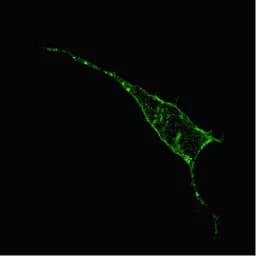
Scientists Help Show Links Between Genes, Body Tissues
Johns Hopkins University scientists are part of a research team assessing how a person's genetic profile affects his body. The results could help show how individual genetic differences contribute to disease and guide treatments for heritable disorders such as Alzheimer's, high cholesterol or Type 1 diabetes.
In two related articles published in the current edition of the journal Nature, the researchers report on the most expansive study ever conducted on how genetic patterns lead to molecular changes within specific tissues. The human body has highly specialized organs and tissues that function very differently from each other. Each tissue is affected by different DNA sequencing, which is important to understanding disease processes.
One article shows results analyzing the genome-to-tissue link for genetic variants that are common in humans. The second paper turns to the more challenging problem of predicting the effects of variants that are found in very few individuals, or even in just a single individual.
A variant is a spot in the genome where a person's individual DNA sequence of four biochemicals -- adenine, cytosine, guanine and thymine -- is different from the standard human sequence.
Alexis Battle, a computer scientist in Johns Hopkins' Whiting School of Engineering whose lab conducted the research analysis, said the work is part of a long-term effort to give clinicians and investigators ways to understand the effects of a genetic profile in specific tissues of the body.
"There's a lot we don't understand about how genetic differences affect our bodies, and different diseases," Battle said. She added that the work on rare genetic variants "is a step toward realizing the goal of personal genomics."
That is, the research moves toward a day when clinicians can identify the anomalies in an individual patient's genetic code that cause diseases.
It is a challenging task. Of the 3 billion base pairs of the human genome -- meaning the "rungs" made of the four biochemicals connecting the longer strands of the DNA molecule -- scientists have only characterized the effects of a small percentage.
Part of the significance of the studies published in Nature lies in the size of the tissue sample, which is possible due to the work of the GTEx, or Genotype Tissue Expression project, an effort launched by the National Institutes of Health in 2010. The project has amassed and analyzed 7,051 tissue samples from 449 people.
In the studies reported in Nature, Battle and her colleagues used samples of 42 tissue types -- including blood, liver, stomach, heart, brain, lung and pancreas -- from the 449 people.
The scientists found tens of thousands of variants that have detectable effects in at least one of the tissues they studied. The effects appeared as significant changes to levels of certain molecular markers, including proteins.
Researchers also found 112 spots in the genome with long-range effects on molecular changes, including in tissues where these effects have not previously been detected. They also showed that for disease-associated variants known from other studies, they were able to detect molecular effects for approximately half, more than has ever been shown before.
"This is essential for understanding mechanisms of disease, and is only possible through the large number of tissues available in our dataset," Battle said.
In the paper on rare variants, the scientists showed that these anomalies contribute significantly to extreme changes in cellular markers at the molecular level. Specifically, in 58 percent of cases where someone has extremely low levels of a marker and 28 percent of cases where they have extremely high levels, that person also harbors a rare genetic variant that could explain the molecular change.
The scientists also showed that their new analytical method provides a way to identify which rare genetic variants from an individual are likely to have an impact on their bodies. The method identifies such variants statistically significantly better than any existing methods, and could lead to better genetic diagnoses in clinical settings, Battle said.
Materials provided by Johns Hopkins University. Note: Content may be edited for style and length.
Disclaimer: DoveMed is not responsible for the accuracy of the adapted version of news releases posted to DoveMed by contributing universities and institutions.
References:
Johns Hopkins University. (2017, October 12). Scientists help show links between genes, body tissues. Retrieved October 15, 2017.
Related Articles
Test Your Knowledge
Asked by users
Related Centers
Related Specialties
Related Physicians
Related Procedures
Related Resources
Join DoveHubs
and connect with fellow professionals

0 Comments
Please log in to post a comment.